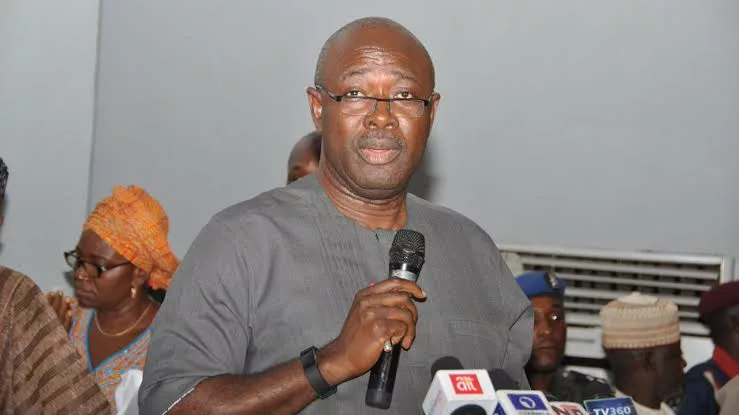The federal government has charged petroleum engineers to devise sustainable solutions to critical challenges facing the oil sector, including low productivity, oil theft, and pipeline vandalism.
Speaking at the annual conference of the Nigerian Institution of Petroleum Engineers (NIPetE) in Abuja on Thursday, minister of state for Petroleum Resources, Heineken Lokpobiri, emphasised the need for innovative, homegrown strategies to enhance the industry’s performance.
Lokpobiri who was represented by the director, Upstream, Ministry of Petroleum Resources, Kamoru Busari, reiterated the need for sustainable solutions in Nigeria’s petroleum sector.
He highlighted the importance of balancing economic growth, energy security, and environmental sustainability amid global energy transitions.
Lokpobiri urged collaboration among industry players to ensure a sustainable future for Nigeria’s oil and gas sector.
“Sustainable Solutions for Nigeria’s Petroleum Industry in the era of Transition is highly critical for the future developments of our Oil and Gas industry and must be with a comprehensive approach that balances economic growth, energy security, and environmental sustainability.
According to him, the global energy landscape is changing due to fluctuating oil prices, geopolitics, climate change and energy transition. “We must therefore adapt our oil and gas strategy to ensure long-term sustainability and competitiveness.
The minister noted that Nigeria’s response has been proactive to revitalise the entire upstream, midstream and downstream sector through infrastructure modernisation, security enhancement, regulatory streamlining, investment attraction,technology adoption and cultivating partnerships that transcend borders and ideologies by balancing our economic dependence on oil and gas resources with the need for sustainability.
Lokpobiri said the future of the global Oil and Gas Industry and by extension Nigeria’s Petroleum industry remains bright, as global energy demand will rise by an estimated 24 per cent by 2050 according to OPEC 2024 World Oil Outlook (WOO).
“This demand will be fueled by a world economy that is expected to double in size, growing from $165 trillion in 2023 to $358 trillion in 2050. OPEC forecasts a rapidly expanding world population that will surpass more than 9.5 billion people by 2050 from a level of eight billion today, with most growth driven by a substantial geographical surge in non-OECD developing countries. Urbanisation alone will account for over half a billion people moving to cities around the world by 2030
In bridging the projected global estimated demand growth, the upstream regulator NUPRC recently launched the additional one million barrels per day (mb/d) initiative to ramp up the country’s oil production.
“This initiative is a fair target considering our national technical production potential of over 2.26 million barrels per day (mb/d). I challenge industry players to tell the government what we can do to add 2 million barrels per day (mb/d) to the existing production within the next two years.
Lokpobiri maintained that the initiative would be achieved by:
“Optimising all our existing assets by implementing enhanced Oil (EOR) methods to maximise extraction from mature fields, and fast-tracking development projects; Expediting approval processes for ongoing bid rounds and projects to ensure early production; Swift approval to facilitate the development of new discoveries, focusing on shallow water and onshore fields; Encouraging exploration in under-explored regions, utilising advanced technologies.”
He expressed optimism that oil and gas will continue to be an integral part of the energy mix for the foreseeable future with its share in the global energy mix projected to stay above 53 per cent through 2050, with oil alone retaining the largest share at above 29 per cent as world demand to an estimated 120 million barrels per day by that time, with a potential for it to be higher. According to him, to meet the rapid and robust growth in energy consumption, the industry needs to boost investment levels significantly in the years to come.
“Based on OPEC’s research, cumulative oil-related investment requirements from now until 2050 will amount to approximately $17 trillion or around $630 billion on average per year. Securing this vital funding is essential to maintaining security of supply and avoiding unwanted volatility,” the minister noted.
Also speaking, an energy expert and lawyer at the Centre for Petroleum, Energy Economics and Law, University of Ibadan, Professor Yinka Omorogbe, stressed the need for strong administration and implementation of the Petroleum Industry Act (PIA) 2021 so that the country can optimise the benefits.
Omorogbe said the law was no longer the problem in Nigeria’s oil and gas sector since the passing of the PIA in 2021.
However, to make the law effective, the roadblocks inhibiting implementation must be dismantled.
“Our problem is not the law and regulation. Our problem lies in administration and implementation. You need a law that is in alignment with policy. You need to make sure that there is administration, enforcement and implementation. And this is where we go wrong in Nigeria and are still going wrong.
She stressed the importance of the midstream and downstream in the overall development of the country.
According to her, while oil exploration is great to get the oil out of the ground, it’s much better to make sure that oil finally gets to the productive sector that needs it.
Much the better “if it can get to us through industries and activities that are in-country, as opposed to going outside, being refined, spending a lot of money to bring it back, going through demurrage, barge costs, customs costs, et cetera, coming back to us at all sorts of funny prices and then we buy it and then we’re going through problems. That’s an issue. So those are some things you need to think about,” the don said.
She said while Nigeria’s growth depends on the petroleum sector as it remains the driver of the Nigerian economy, “We need to deal with our roadblocks, or we need to look hard and fast at the roadblocks. It’s not the law anymore, really, with PIA. Anything wrong with the law, you can amend. It’s the easiest thing. But when you live in an environment that says, you know, whether they write whatever they like, we will do whatever we want, then you have problems.”
“The law is important. It’s very central. It’s fundamental. It’s like a skeleton. You must have it. But at the end of the day, it’s not the skeleton that makes you fat and healthy. It is action and implementation that will make us fat and healthy. And that is what we want. If we want Nigeria to truly develop, the roadblocks must be dismantled,” Prof Omorogbe said.





